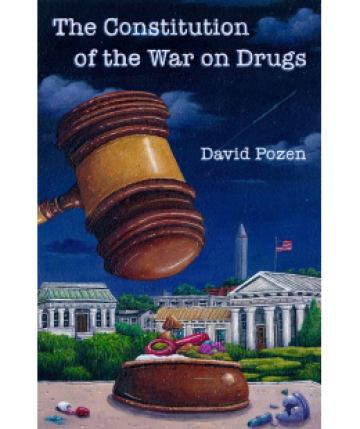The Fight for Your Right to Party
In his new book, David Pozen, Charles Keller Beekman Professor of Law, examines the constitutional arguments for drug rights—and how courts have shut them down.

In the crowded field of constitutional law, David Pozen noticed something missing.
As public opinion and laws on cannabis use have shifted away from the intensely punitive approach of the “war on drugs,” the Columbia Law professor was struck by the absence of arguments that smoking or possessing marijuana is a right protected by the Constitution—particularly because the United States is known for “constitutionalizing almost every significant social issue and policy debate,” he says.
“I wanted to know, where did the Constitution go?” he says.

He answers the question in The Constitution of the War on Drugs, the first book written by Pozen and the most recent title in the Oxford University Press Inalienable Rights series. (It is also available as a free download.) The book, published in April 2024, has been described as “a triumph of the legal imagination” by Princeton University legal historian Hendrik Hartog and has already been the subject of a symposium on the legal blog Balkinization.
Personal liberty, racial equality, and government rationality are among “the key tropes and themes of modern American constitutional law,” Pozen says. “And yet, the drug reform movement never seems to invoke the Constitution itself.”
As Pozen began researching case law, however, he discovered more than he expected. There was a “major push for drug rights” in the 1960s and 1970s. In fact, Pozen says, he was surprised by “the robustness of the movement for constitutional drug rights and how much headway it made.”
Throughout the period, advocates argued that criminal drug bans violated the rights of due process, equal protection, federalism, free speech, free exercise of religion, and humane punishment. The book examines each type of constitutional claim brought against drug prohibition and their initial success—including notable cases such as Ravin v. State, a 1975 Alaska Supreme Court case that held that the state’s marijuana ban violated the right to privacy, and Trust Territory v. Bermudes, a 1974 decision that found that the classification of cannabis in the same category as heroin was so irrational that it violated the constitutional guarantee of equal protection. (Pozen calls this decision, which had never been cited before, a prize research “nugget.” He discovered it by combing the archives of NORML, the National Organization for the Reform of Marijuana Laws.)
Liberalization efforts ultimately ran into the war on drugs of the 1980s, with mandatory minimum sentences, militarized policing, and panic over crack cocaine. But even before then, courts began rejecting substantive due process claims if they were not deemed to involve “fundamental liberty interests,” and the right to use drugs did not make the cut. “Very few judges are willing to say you have a fundamental right to smoke pot,” Pozen says.
He argues that the fundamental liberty test emerged as courts faced a tidal wave of liberty and privacy rights claims in the 1970s, not only in drug cases but also in lawsuits alleging a right to ride a motorcycle without a helmet or to wear long hair contrary to government regulations.
“Once the judiciary opened the door to those kinds of substantive liberty and privacy claims, people flooded the courts,” he says. “The rise of the ‘fundamentality’ threshold to making a winning liberty claim arose, in part, to close the floodgates.”
Behind the pushback in the courts was not only “growing anticrime, antidrug sentiment,” Pozen says, but also the worry that courts would be doing “too much line-drawing” in cases that posed difficult questions, such as whether addicts are responsible for their behavior or whether drug sentences were disproportionate to the danger of the drug.
“Anticrime sentiment was paired with a retreat into formalism, through which judges tried to minimize their own analytic burdens and simplify their jobs,” he says. “It was easier, jurisprudentially as well as politically, to capitulate to law enforcement.”
Shifting the Debate
In outlining ways in which courts upheld drug prohibition against arguments of personal liberty and other rights, Pozen says he is not arguing that courts should have found drug rights to be constitutionally protected—as marketable as that argument might be.
“The book probably would sell better if the framing was ‘I’m here to tell you that you have a right to use drugs!’” he says. “Instead, I’m here to tell readers that it’s plausible that certain kinds of drug rights exist—and that the story of how they came to seem implausible is interesting and instructive.”
For his students beginning their studies of constitutional law, Pozen says he hopes the book will be useful “because it offers a kind of guided tour through key areas of the Constitution. Through the lens of drugs, you can see clearly how different issues connect.”
With a broader audience, Pozen would like the book to “move the debate in the direction of less punitive drug policy, in recognition of all the constitutional values on the other side,” he says. “The fact that we’ve almost completely lost touch with the long history of understanding drug prohibition to be constitutionally problematic has made for imbalanced, inadequate consideration of the full range of interests that ought to inform drug policy.”
More recent constitutional arguments related to drugs have focused on practices of law enforcement, such as the opposition to stop-and-frisk policies, racial profiling, and drug testing. To Pozen, those arguments have skipped an important step. “All those issues are important, of course. But they are downstream from the first-order issue of when drug behaviors can be prohibited in the first place.”
Going forward, Pozen sees recent recriminalization legislation in states like Oregon as possible signs of a new “drug panic.” Yet at the same time, the move to liberalize drug laws is “stronger than I’ve seen in my lifetime,” he says. Pozen also notes, and details in the book’s closing chapter, that constitutional courts in other countries “are increasingly recognizing rights against criminal punishment for the personal possession and use of drugs like marijuana.”
Don’t expect the constitutional arguments to stop. “These issues are evergreen,” Pozen says. “People are always going to use psychoactive drugs, and it’s always going to be a struggle to figure out how to regulate them in ways that respect adults’ autonomy while leading to better public health.”
